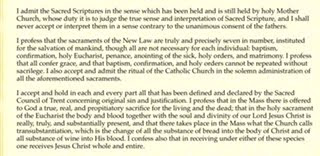Note the phrase “in a sense contrary to the UNANIMOUS consent of the fathers” and the phrase: “transubstantiation, which is the change of all the substance of bread into the body of Christ and of all the substance of wine into His blood.”
And ponder then these words of the great Pope, St. Gelasius, who could not be clearer:
Certainly the sacraments of the body and blood of Christ are a divine thing, through which we are made partakers of the divine nature; and yet the substance or nature of bread and wine does not cease to be. – De duabis nature. In Chr. Adv. Eutych. Et Nestor. Patrology IV, 1:422
One may have one of these things, but for the life of me I do understand how one can profess BOTH. If Pope St. Gelasius is correct (and since his words accord with the Sacred Scriptures that's a given for a Lutheran; cf. 1 Cor. 10:16; 1 Cor. 11:27), the position regarding transubstantiation as here articulated runs afoul of the “unanimous” consent of the fathers. There is no question that the fathers took quite literally and seriously the Lord's promise in His Testament: “this IS my body...this IS my blood of the new (and everlasting) covenant).” Yet they held this holy mystery in the conviction that in a way beyond our understanding there is a communion of the earthly and the heavenly in the Sacrament, as not only St. Gelasius but also St. Irenaeus bears witness.


No comments:
Post a Comment